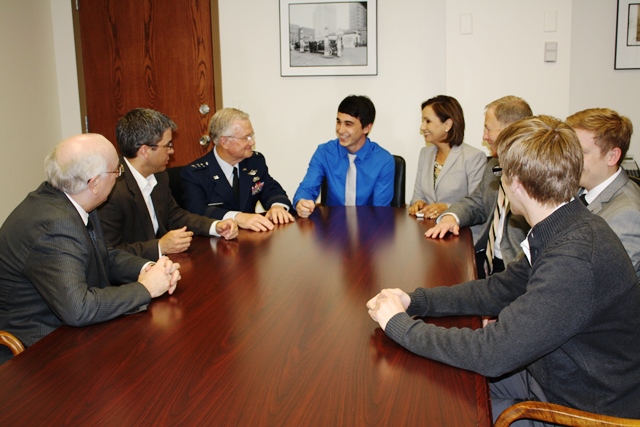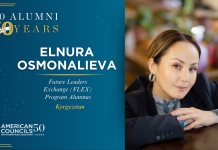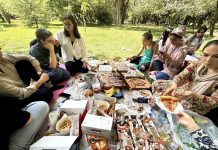‘I would love to build on my professional experience and bring all of the new skills back to my country. I hope to be useful in Tajikistan and contribute to the country’s development. The experience that triggered this ambition and made other opportunities possible was the FLEX program’.
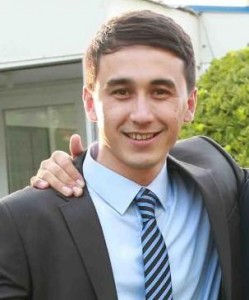 Kholmati Kholik ‘09
Kholmati Kholik ‘09
Kanibadam, Tajikistan / Ionia, Michigan
Education: BA in International Relations from Tajik National University, currently studying for his MA in Global Political Economy at University of Kassel
Message to FLEX alumni: ‘Surround yourself with smart inspiring people who will motivate you to achieve bigger results. Be active in bringing the change without expecting a reward– if you do great work, like-minded people will find you’.
This August Kholmat moved to Germany where for the next two years he will be studying for his MA in Global Political Economy at the University of Kassel on DAAD Masters Scholarship Program. ‘I decided to apply for this program because I realized that I needed more academic knowledge and international experience. At Kassel I’ll be studying together with students from 21 different countries and will have a chance to explore their perspectives as well as German cultural values and work ethic’.
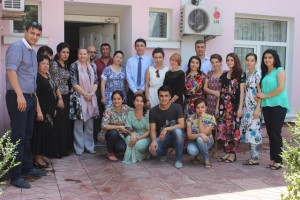 Prior to his move Kholmat worked as a Project Assistant at International Organization for Migration in Dushanbe. In this position he provided assistance in project management and logistical support to the Regional Migration Program. The issue of labor migration is extremely important in Tajikistan where over 10 percent of the country’s entire population work as labor migrants abroad and up to half of the country’s GDP comes from labor work remittances.
Prior to his move Kholmat worked as a Project Assistant at International Organization for Migration in Dushanbe. In this position he provided assistance in project management and logistical support to the Regional Migration Program. The issue of labor migration is extremely important in Tajikistan where over 10 percent of the country’s entire population work as labor migrants abroad and up to half of the country’s GDP comes from labor work remittances.
‘Most people go to Russia and there, not knowing their rights and language, they often face discrimination and violence,’ says Kholmat. ‘Working on the issue of labor migration is extremely important to me. Had I not gone to America as a FLEX student, I would’ve probably become a labor migrant myself. That’s what many young men in my region do after high school’.
One of the components of the Regional Migration program is to ensure safety of Tajik labor migrants by educating them on their rights and connecting them with foreign employers through the newly-established governmental Agency for Employment Abroad under the Ministry of Labor, Migration, and Employment of the Republic of Tajikistan. Developed in partnership with the Department for International Development (DFID) and IOM, the Agency was officially opened to the public in June 2015. IOM’s staff taught Agency’s employees how to conduct the recruitment process for labor migrants and prepare them for their life abroad. In just the first six months of the program nearly 200 future migrants were recruited and trained.
Another aspect of Kholmat’s work was raising awareness of migrants’ issues through local youth NGOs. Kholmat worked with the NGOs to organize discussions with community representatives and religious leaders in high schools and produce a TV show to reach a wider audience with the issue. ‘One of the great dangers of labor migration is human trafficking. When labor migrants get their passports taken away from them and are made to work for free. During school discussions we taught young people how to prevent trafficking situations and promoted the work of the new agency,’ says Kholmat.
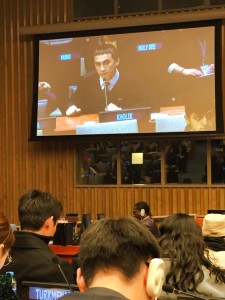 One highlight of his work with IOM took place when Kholmat represented the organization at the ECOSOC Youth Forum entitled ‘Youth Engagements in the Transition from MDGs to SDGs: What will it take?’ which took place in February 2015 at the UN Headquarters in New York. ‘There I had a chance to describe the critical migration situation in Tajikistan and invite policy-makers to include this issue in the Sustainability Development Goals’.
One highlight of his work with IOM took place when Kholmat represented the organization at the ECOSOC Youth Forum entitled ‘Youth Engagements in the Transition from MDGs to SDGs: What will it take?’ which took place in February 2015 at the UN Headquarters in New York. ‘There I had a chance to describe the critical migration situation in Tajikistan and invite policy-makers to include this issue in the Sustainability Development Goals’.
According to Kholmat, the most effective solution to the labor migration problem is creating opportunities for young people at home. However, achieving results will require a lot of time and resources. ‘Such big change cannot be brought in a day. I think we should start by taking small steps. For example, the government can introduce grant programs inviting Tajik professionals who are living abroad to bring their skills back to the country. There should also be trainee and internship programs for high schools students’.
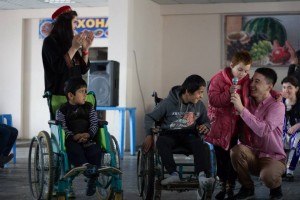 He believes that his experience of organizing youth projects as a FLEX alumnus and as an Alumni Coordinator was extremely useful in his career. Serving as a FLEX Alumni Coordinator of Tajikistan in 2011-2012 Kholmat implemented a wide range of community projects in the capital and regions. Together with other FLEX alumni he reconstructed bathrooms in a children’s tuberculosis center in a rural area, conducted English language camps for orphanages, and facilitated hygiene projects. In the winter of 2013 he was part of a fundraising campaign to buy 300 sets of winter clothing for children at the Hisor Orphanage for children with disabilities. ‘Initially we planned only a New Year’s party, but it turned into a much larger, long-lasting, and multi-faceted project. The initiative was a huge success; in just three weeks with the help of local and international community, FLEX alumni fundraised over $2,500, which covered all the necessary costs. Since then, alumni have organized multiple fundraising events for the Hisor Orphanage and run hold regular language and skills training classes for the children.
He believes that his experience of organizing youth projects as a FLEX alumnus and as an Alumni Coordinator was extremely useful in his career. Serving as a FLEX Alumni Coordinator of Tajikistan in 2011-2012 Kholmat implemented a wide range of community projects in the capital and regions. Together with other FLEX alumni he reconstructed bathrooms in a children’s tuberculosis center in a rural area, conducted English language camps for orphanages, and facilitated hygiene projects. In the winter of 2013 he was part of a fundraising campaign to buy 300 sets of winter clothing for children at the Hisor Orphanage for children with disabilities. ‘Initially we planned only a New Year’s party, but it turned into a much larger, long-lasting, and multi-faceted project. The initiative was a huge success; in just three weeks with the help of local and international community, FLEX alumni fundraised over $2,500, which covered all the necessary costs. Since then, alumni have organized multiple fundraising events for the Hisor Orphanage and run hold regular language and skills training classes for the children.
Inspired by the success of the Hisor Orphanage campaign, Kholmat later fundraised $150 to purchase a wheelchair for his neighbor’s son who has cerebral palsy. ‘His father worked in Russia and the family didn’t have much money. I posted the story on Facebook and with donations from local FLEX alumni and American Councils’ staff the necessary sum for a wheelchair was quickly gathered’. With successes like these, Kholmat has the confidence to move forward in making positive change in his community.
After completing a master’s degree, Kholmat plans on spending a few years working in Germany before eventually returning to Tajikistan. ‘I would love to build on my professional experience and bring all of the new skills back to my country. I hope to be useful in Tajikistan and contribute to the country’s development. The experience that triggered this ambition and made other opportunities possible was the FLEX program’.
Article written by Tatyana Movshevich

